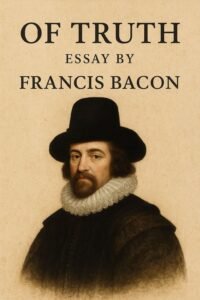Introduction
Francis Bacon’s “Of Truth” is one of his most profound and philosophical essays, exploring the nature, value, and importance of truth in human life. He begins with a famous reference to Pontius Pilate, who cynically asked, “What is truth?” but did not wait for an answer. This opening reflects humanity’s tendency to avoid serious reflection on truth. Many people, Bacon observes, enjoy uncertainty and consider it a kind of freedom not to be bound by firm beliefs. To them, fixed conviction feels like bondage, and they take pride in keeping their minds open to constant doubt.

OF Truth Essay Context
Bacon’s Of Truth essay then explores why people prefer lies to truth. It is not merely because truth is hard to find or because it demands discipline once discovered. Rather, human beings, he says, have a “natural though corrupt love of the lie itself.” Even when lies bring no profit or pleasure—as in trade or poetry—people still enjoy them for their own sake. Bacon compares truth to bright daylight, which reveals the world plainly, whereas lies resemble candlelight, which makes the world appear more beautiful and appealing. Just as some prefer the flattering glow of candlelight to the harsh clarity of the sun, so too do people often prefer illusion over reality.
Truth, Bacon writes, is like a pearl that shines clearly by day but lacks the colorful sparkle of jewels that glitter in artificial light. In other words, truth is simple, pure, and steady, while lies add excitement and glamour. A mixture of falsehood often makes life more pleasant; without illusions, Bacon admits, many people would find life dull and depressing. Human minds are filled with vain opinions, flattering hopes, and false values; removing these would make life seem like “poor shrunken things.”
However, Bacon warns that while lies in imagination or poetry are harmless, those that take root in belief are deeply dangerous. They corrupt the mind and destroy moral integrity. Against humanity’s fondness for deceit, Bacon upholds truth as the highest good. He describes three stages of truth: the *inquiry* of truth (the search for it), the knowledge of truth (its discovery), and the belief of truth (its acceptance and practice). Together, these form the “sovereign good of human nature.” Truth, like divine light, was God’s first creation and continues to illuminate the human soul.
Bacon further illustrates the joy of truth through a poetic image from Lucretius: standing safely on the shore and watching others tossed by the sea. Yet he warns that this pleasure must be tempered with pity, not pride. The person who lives in truth, he says, finds “heaven upon earth,” resting his mind in charity, providence, and peace.
Conclusion
In the Of Truth essay’s final section, Bacon turns from philosophical truth to practical truth in daily life. Honesty, he asserts, is man’s greatest honor. Falsehood may bring short-term gain, like alloy in gold that makes it easier to work, but it lowers moral value. Deceit, he says, is the crawling motion of the serpent—shameful and base.
Lying not only dishonors man but also offends God. The essay concludes with a warning that when falsehood spreads widely, divine judgment will follow, for when Christ returns, “He shall not find faith upon the earth.”